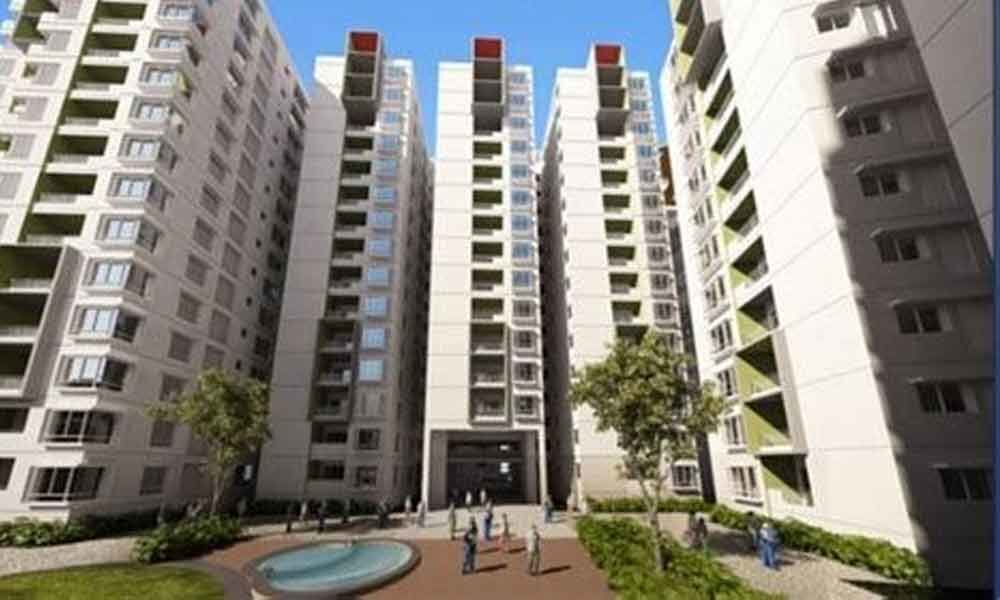Live
- Nizamabad MP Dharmapuri Arvind and Jagtial MLA Dr. Sanjay Kumar Meet CM Revanth Reddy
- Hyderabad CP CV Anand Issues Stern Warning to Bouncers
- MP Laxman Criticizes Police Conduct, Calls for Support for Victims' Families
- Fire Breaks Out in Kachiguda-Chennai Egmore Express, Passengers Evacuated Safely
- CM Revanth Reddy Condemns Attacks on Film Personalities' Homes, Calls for Strict Action
- Victory Venkatesh and Nandamuri Balakrishna to Set Screens on Fire with Unstoppable Season 4
- Over 71.81 crore Ayushman Bharat Health Account numbers generated: Centre
- In special gesture, Kuwait's Prime Minister sees-off PM Modi at airport after conclusion of historic visit
- Veer crowned PGTI Ranking champion, Shaurya wins emerging player honour
- Sr National Badminton: Unseeded Rounak Chauhan, Adarshini Shri reach singles semis
Just In

Hyderabad topped the capital performance charts with a three percent rise in average weighted prices of residential apartments in Jan-Mar 2019 against the previous quarter, said ‘99acres.com
New Delhi: Hyderabad topped the capital performance charts with a three percent rise in average weighted prices of residential apartments in Jan-Mar 2019 against the previous quarter, said '99acres.com
Insite' - a quarterly report focusing on capital and rental price trends in the residential realty market across eight major cities of India.
According to the report, property prices in Delhi NCR, Chennai, Pune and Kolkata remained unchanged, QoQ.
Bangalore, Mumbai and Ahmedabad recorded a marginal one percent uptick in average capital prices, QoQ.
Barring Delhi NCR, where excess inventory kept rental 'asks' under pressure, all other metro cities registered a three percent hike in rentals, YoY (Jan-Mar 2019 vs. Jan-Mar 2018).
Speaking on the report, Maneesh Upadhyaya, chief business officer, 99acres.com, averred, "Indian real estate displayed a seemingly positive home buying sentiment in Jan-Mar 2019.
However, the quantum of sales reflected a paradoxical situation in several cities including Mumbai, Pune, Kolkata, Hyderabad, Chennai, and Ahmedabad.
The Interim Budget 2019, the revision in GST norms and the upcoming General Elections kept buyers waiting for an opportune time to invest in the market."
"Resultantly, the average weighted capital prices in Delhi NCR, Chennai, Pune and Kolkata maintained status quo, QoQ.
While Hyderabad topped the capital performance charts with a three percent rise in prices, QoQ, Bangalore, Mumbai and Ahmedabad managed to scale a one percent uptick in property values.
Limited number of new launches in the face of the NBFC crisis and in anticipation of the GST rate cut aided the absorption of the existing unsold inventory, which dipped by 10-20 percent in cities like Delhi NCR, Mumbai, Bangalore and Chennai over the last one year.
Clarity on the actual benefit of reduced GST rates and the results of the General Elections 2019, will further decide the course of real estate market in the ensuing quarters."
The first quarter of 2019 saw the remnants of the past including the liquidity crisis in NBFCs altering the course of Indian real estate.
Contrary to expectations, despite improved buying sentiment, sales volume remained tepid across cities, keeping prices under check in Jan-Mar 2019.
Debt-laden developers struggled to complete ongoing projects and held new launches in anticipation of the revised GST regime.
The trimming of the unsold inventory is seen as a boon, as the average 'quarters to sell' (QTS) now stand at 10.2, as against 11.2 a year ago.
The Jan-Mar 2019 quarter, which marked several milestones for the real estate sector in India, started with the Interim Budget 2019 introducing multiple pro-sectoral reforms including tax sops for buyers and developers.
The boost given to affordable housing spoke volumes about the course that the Indian real estate sector would pick up in the times to come.
It was soon followed by a cut in the repo rate by 25 basis points, and then the reduction in the GST slabs on under-construction and affordable housing segments.
The launch of India's first Real Estate Investment Trust (REIT), too, was seen as a significant step towards an organised real estate industry in India.
The Government's efforts towards giving a fillip to affordable housing reaped returns as sales remained inclined for homes priced within Rs 50 lakh, across cities.
This was evident with the government extending the Credit Linked Subsidy Scheme for Middle-Income Group (MIG) housing to up to 3.4 lakh beneficiaries, after witnessing healthy demand from homebuyers.
Until now, the government has released a total subsidy of nearly Rs 75,000 crore.
RERA continued toinstill confidence among aggrieved home buyers; however, inefficient implementation of the Act in Delhi, Telangana and Tamil Nadu marred home buying sentiment.
Maharashtra remained the front runner in the implementation of RERA with over 20,180 projects registered with it.
Telangana faired with a measly 550 registered projects.
With several States pulling the plug and becoming stringent about project registrations under RERA, the future seems promising.

© 2024 Hyderabad Media House Limited/The Hans India. All rights reserved. Powered by hocalwire.com







